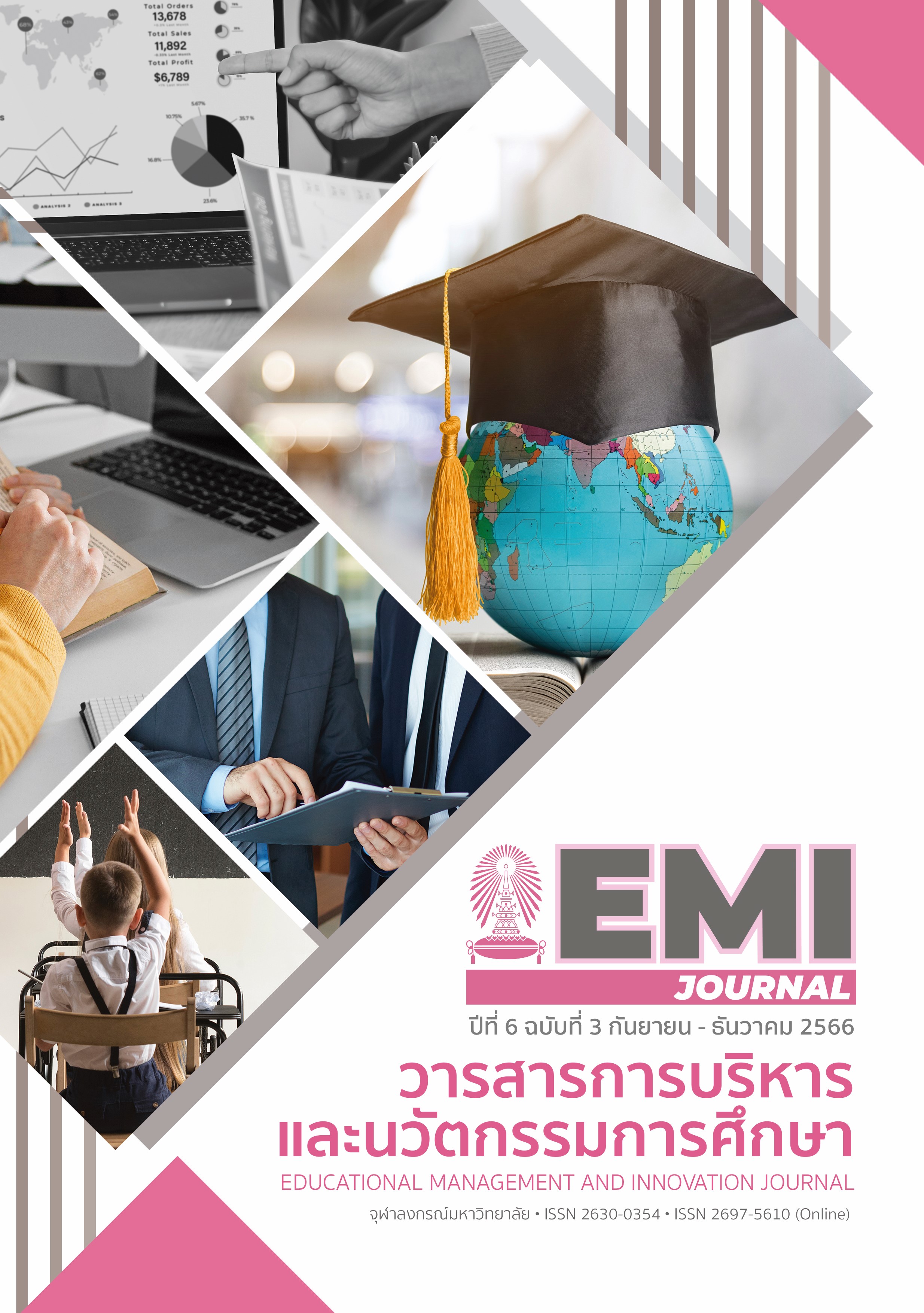The Teachers’ Ability in Designing Learning Activities with Design Thinking Process to Add Value of Local Products: A Case Study of Borkaewwittaya School, Kamphaeng Phet Province
ความสามารถครูในการออกแบบกิจกรรมการเรียนรู้ด้วยกระบวนการคิดเชิงออกแบบ เพื่อเพิ่มมูลค่าผลิตภัณฑ์ท้องถิ่น : กรณีศึกษาโรงเรียนบ่อแก้ววิทยา จังหวัดกำแพงเพชร
คำสำคัญ:
การออกแบบกิจกรรมการเรียนรู้ การคิดเชิงออกแบบ การเพิ่มมูลค่าผลิตภัณฑ์ท้องถิ่นบทคัดย่อ
การวิจัยนี้มีวัตถุประสงค์เพื่อ 1) สังเคราะห์พฤติกรรมบ่งชี้การออกแบบกิจกรรมการเรียนรู้ด้วยกระบวนการคิดเชิงออกแบบเพื่อเพิ่มมูลค่าผลิตภัณฑ์ท้องถิ่น 2) ศึกษาความสามารถครูในการออกแบบกิจกรรมการเรียนรู้ด้วยกระบวนการคิดเชิงออกแบบเพื่อเพิ่มมูลค่าผลิตภัณฑ์ท้องถิ่น กลุ่มเป้าหมายเป็นครูโรงเรียนบ่อแก้ววิทยา จังหวัดกำแพงเพชร จำนวน 23 คน ได้มาจากการเลือกแบบเจาะจง ใช้ระเบียบวิธีวิจัยเชิงปฏิบัติการ เครื่องมือที่ใช้ในการวิจัย ได้แก่ แผนการจัดกิจกรรมฝึกอบรมครู และแบบประเมินความสามารถในการออกแบบกิจกรรมการเรียนรู้ด้วยกระบวนการคิดเชิงออกแบบ แบบสังเกตการสอน พัฒนาครูด้วยการอบรมเชิงปฏิบัติการ และการพัฒนาบทเรียนร่วมกัน วิเคราะห์ข้อมูลโดยการวิเคราะห์เนื้อหาและค่าเฉลี่ย ผลการวิจัยพบว่า 1) พฤติกรรมบ่งชี้การออกแบบกิจกรรมการเรียนรู้ด้วยกระบวนการคิดเชิงออกแบบเพื่อเพิ่มมูลค่าผลิตภัณฑ์ท้องถิ่น โดยสรุปคือ การเป็นโค้ชนักเรียนสร้างรูปแบบผลิตภัณฑ์ รูปแบบการขาย หรือรูปแบบบรรจุภัณฑ์ที่แปลกใหม่และมีคุณค่า โดยคำนึงถึงความต้องการของผู้ใช้ซึ่งพฤติกรรมบ่งชี้มีกระบวนการ 5 ขั้นตอน ได้แก่ ทำความเข้าใจปัญหา กำหนดปัญหา หาทางเลือก สร้างต้นแบบ และขั้นทดสอบ มีความเหมาะสมอยู่ในระดับดี 2) ความสามารถครูในการออกแบบกิจกรรมการเรียนรู้ด้วยกระบวนการคิดเชิงออกแบบเพื่อเพิ่มมูลค่าผลิตภัณฑ์ท้องถิ่น ภาพรวมอยู่ในระดับดี โดยมีคะแนนขั้นสร้างต้นแบบสูงสุด รองลงมา ได้แก่ ขั้นทดสอบ และขั้นหาทางเลือก และต่ำสุด คือ ขั้นทำความเข้าใจปัญหา ดังนั้นการพัฒนาครูควรมุ่งให้เห็นความสำคัญของการทำความเข้าใจ และกำหนดปัญหา
Downloads
เอกสารอ้างอิง
Anif, S., Sutopo, A., & Joko Prayitno. H. (2020). Lesson Study Validation: Model for Social and Natural Sciences Teacher Development in the Implementation of National Curriculum in Muhammadiyah Schools, Indonesia. Universal Journal of Educational Research, 8(1), 253-259. Retrieved from http://www.hrpub.org
Areeraksakul Konglok, S. (2020). The Development of Mathematics Teachers Competency on Learning Management by Using the Lesson Study of Elementary Schools in Nonthaburi Province. STOU Educational Journal, 13(1), 175-190.
Chen, F. (2014). Primary Investigation on reform of post practice mode based on school-enterprise collaborative innovation. Retrieved from https://www.atlantis-press.com/proceedings/icetss-14/14672
Deborah, J. H. (1991). How To Integrate Language and Content Instruction: A Training Manual (2nd ed.). Retrieved from https://www.files.eric.ed.gov/fulltext/ED359780.pdf
Goldman, S., Carrol, M., & Royalty, A. (2009). Destination, Imagination & The Fires Within: Design Thinking in a Middle School Classroom. Retrieved from https://www.researchgate.net/publication/ 221629718
Hargreaves, D. H. (2003). Education epidemic: Transforming secondary schools through innovation networks. Retrieved from https://www.demos.co.uk/files/educationepidemic.pdf
Kagan, D. M. (1992). Professional growth among pre-service and beginning teachers. Review of educational research, 62, 129-169.
Kriswanto, D., & Hasanah, E. (2021). The principal’s role in improving teacher competence. Journal Manajemen Pendidikan Islam, 5(3), 1-13.
Levin, H. (1988). Educational Evaluation and Policy Analysis. Retrieved from https://www.academia.edu/ 32362875/Cost_Effectiveness_and_Educational_Policy
Limpanont Promratana, P., & Chantraukrit, P. (2018). Effects of Lesson Study on M.Ed. Students’ Ability in Designing and Teaching Inquiry–Based Science Process Skills Instruction. J. Res. Unit Sci. Technol. Environ. Learning, 9(2), 250-263.
Lui, W. Ch., & Goh, CCM. (2018). Teachers’ perceptions, experience, and Learning. Abingdon: Routledge.
Melles, G., Z. Howard, & S. Thompson-Whiteside. (2012). Teaching Design Thinking: Expanding Horizons in Design Education. Procedia - Social and Behavioral Sciences, 31, 162-166.
Ngourungsi, K. (2020). The national direction for research and development. (Unpublished manuscript).
Office of the Education Council. (2018). Thailand Education Scheme (2017-2036). Bangkok: Prikwarn Graphic.
Office of the Education Council. (2019). The National Standard 2018. Nonthaburi: 21century.
Prušević, S., & Filduza. (2020). The Teacher as the Innovator of the Teaching Process. Retrieved from http://www.dhs.ff.untz.ba/index.php/home/article/view/356
Schwartz, D., Bransford, J., & Sears, D. (2005). Efficiency and Innovation in Transfer. Retrieved from http://www.web.stanford.edu/~danls/Efficiency%20and%20Innovation%204_2004.pdf
Stanford d. school. (2016). Design Thinker. Retrieved from https://www.thedesignthinker.com.au/ influencers/stanford-d-school
The Global Innovation Index (GII). (2015). Effective Innovation Policies for Development. https://www. globalinnovationindex.org/userfiles/file/
Verhoef, N. C., Coenders, F., Pieters, J. M., Smaalen, D.V., & Tall, D. O. (2015). Professional development through lesson study: teaching the derivative using GeoGebra. Retrieved from http://www. homepages.warwick.ac.uk/staff/David.Tall/pdfs/dot2015c-verhoef-et-al-derivative geogebra.pdf
Wasi, P. (2014). Learning Revolution to Turning in Thailand. Bangkok: Pimluck.
ดาวน์โหลด
เผยแพร่แล้ว
ฉบับ
ประเภทบทความ
สัญญาอนุญาต
ลิขสิทธิ์ (c) 2023 วารสารการบริหารและนวัตกรรมการศึกษา

อนุญาตภายใต้เงื่อนไข Creative Commons Attribution-NonCommercial-NoDerivatives 4.0 International License.



